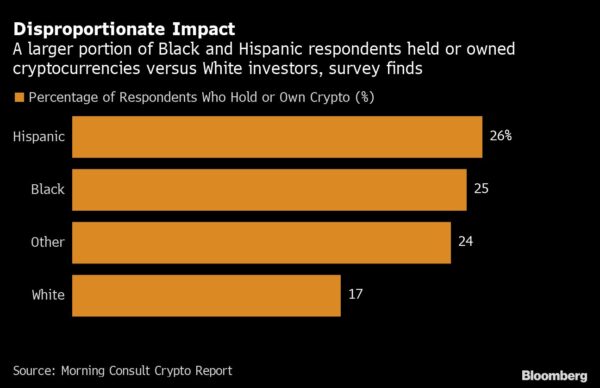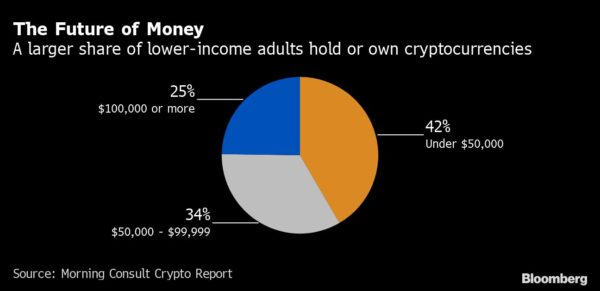By Paulina Cachero
Crypto assets that lured investors of color with the promise of quick wealth are now in freefall, threatening to widen existing inequities in financial markets.
In a June survey of more than 4,400 adults, about a quarter of Black and Hispanic respondents said they owned or held cryptocurrencies, compared with just 17% of their white counterparts, according to a new report from business intelligence firm Morning Consult. That implies a larger proportion of investors of color have been hurt by the crypto rout, which has wiped away $2 trillion in market value since last fall.

Black households are nearly six times more likely to be under- or un-banked than their white counterparts and are more frequently denied mortgages to own a home, which has long been viewed as the key to financial success and security. That’s created stark inequities, with the typical white household having $188,200 in family wealth compared to $24,100 among Black families and $36,100 for Hispanic households, according to a 2019 survey from the Federal Reserve.
Enter crypto, which has been hailed as a decentralized asset with the power to democratize access to money and financial services — and has proven to be particularly attractive to investors from minority groups who have faced barriers to building wealth from traditional financial institutions including banks, according to Charlotte Principato, a financial services analyst for Morning Consult.

“The barrier to entry for crypto is lower,” Principato said. “Black consumers in particular see crypto as an opportunity to build wealth outside of a traditional system that has not served them well historically.”
Read more: Young Black Americans Wary of the Stock Market Are Turning to Crypto
US adults who owned digital tokens believed crypto would help them get rich quick: 63% of crypto holders across ethnicities said making money was a major reason for holding digital assets, according to Morning Consult.
`Fear of Missing Out’
Investors piled in, enticed by tales of overnight crypto millionaires and endorsements from celebrity influencers like Kim Kardashian and Elon Musk. That helped take crypto mainstream, encouraging its use from Wall Street to Main Street, with more than 15% adoption among consumers, Morning Consult found.

“Crypto has become such a cultural phenomenon,” Morning Consult’s Principato said. “There’s a fear of missing out among consumers.”
Wary of stock markets, nearly 40% of young, Black investors eagerly invested in digital assets, ranking crypto as the best investment choice, according to an April survey from Ariel Investments and Charles Schwab Corp.
Now, a larger proportion of them are exposed to an intensifying slump, with the largest cryptocurrencies plummeting by 65% in 2022 alone, according to Bloomberg’s Galaxy Crypto Index.
A larger share of exposure to digital assets means the downturn is inflicting more pain for Black and Hispanic investors, who are less likely to have the financial resources to absorb the losses. Forty-three percent of Black adults and 40 percent of Hispanic adults had a family income below $25,000 in 2021 — at least twice the rate among White and Asian adults, according to Federal Reserve data.
Crypto’s slide is also threatening to compound financial troubles for Black and Hispanic households that face a faster rate of inflation than the national average, New York Fed research showed.
The declines could also spell significant losses for lower-income investors, with 42% of crypto holders reporting a household income below $50,000, according to Morning Consult data.
That said, lower-income cryptocurrency owners were more likely than their higher-income counterparts to believe digital assets are the future of money.
“This all gets back to who in our country has traditionally had access to money,” Principato explained. “Through this data, they’re expressing a hope that there is a future in which they have access to their money in ways that are cheaper and more accessible.”
More stories like this are available on bloomberg.com.




